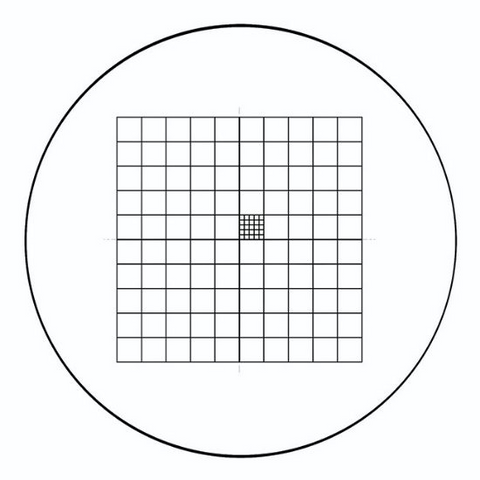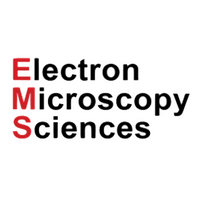
- Collections
NE29 eyepiece reticles, whipple grid (EMS)
Whipple Grid - NE29
Originally designed for water particle analysis, but may be used for other aspects of particle counting. Grid shown: Ratio of full square to smallest is 50:1. Area is 2500:1.
Reference
- Microscopy of Drinking Water.
| Pattern | Description | Diameter | Code |
| NE29 | Whipple grid 100 squares in 7mm area. Surface chrome image. |
16mm | EMS68009-16 |
| 19mm | EMS68009-19 | ||
| 20.4mm | EMS68009-20.4 | ||
| 21mm | EMS68009-21 | ||
| 23mm | EMS68009-23 | ||
| 24.5mm | EMS68009-24.5 | ||
| 25mm | EMS68009-25 | ||
| 26mm | EMS68009-26 | ||
| 27mm | EMS68009-27 |
Squares and Grids
Note: These scales may need to be calibrated, according to intended use. There are a number of uses for the grids and squares listed and they will largely depend on the individual user's application.
Eyepiece Scales
- Sectoring: A squared graticule might be used for the systematic examination of a specimen. Some of the squared patterns are numbered to aid in the identification of areas of interest. Sectioning is particularly useful for making drawings of specimens onto graph paper. The chess-board type of pattern helps the user to distinguish the position being examined: the darker squares are translucent, while the lighter ones are transparent, avoiding eyestrain in prolonged counting as may be necessary in haematology. These patterns provide the same advantages when used with image analysis and capture devices.
- Counting: A squared graticule can be used for counting. Here, the basic principle is that a small area of the specimen is analysed in order to obtain information about the total area. This minimises wasteful work, enabling simple analysis of a particular area. An example of this would be the comparison of large to small particles in a specimen. By using the Miller graticule (NE57) only the smaller particles in the small square are counted, the result being multiplied by ten for comparison with the number of larger particles in the large square.
- Squared Grids: Squared grids can be used in particle size analysis as simple technical aids where sophisticated image analysis systems are not required. The areas of the particles to be measured can be estimated by simply counting the number of squares occupied by those particles. It is necessary to estimate fractions of a square or make a rule (e.g. count as a square all partly covered squares at the right and bottom sides of the grid, and ignore partly covered squares at the left and upper sides of the squares). This method would only be useful for a fairly crude estimation of a large diameter.
| Code | Size | Pack Size | Availability | Price | Updated: 28-11-2025 |
|---|---|---|---|---|---|
| EMS68009-16 | 16mm | Each | 0 in stock (?) | $229.00 AUD | |
| EMS68009-19 | 19mm | Each | 0 in stock (?) | $229.00 AUD | |
| EMS68009-20.4 | 20.4mm | Each | 0 in stock (?) | $229.00 AUD | |
| EMS68009-21 | 21mm | Each | 0 in stock (?) | $229.00 AUD | |
| EMS68009-23 | 23mm | Each | 0 in stock (?) | $229.00 AUD | |
| EMS68009-24.5 | 24.5mm | Each | 0 in stock (?) | $229.00 AUD | |
| EMS68009-25 | 25mm | Each | 0 in stock (?) | $248.00 AUD | |
| EMS68009-26 | 26mm | Each | 0 in stock (?) | $248.00 AUD | |
| EMS68009-27 | 27mm | Each | 0 in stock (?) | $248.00 AUD |
* Ordering Schedule
This item is available for back-order where 0 stock is listed.
We order from this manufacturer weekly, with an estimated lead time of 4 weeks.
This is the estimated lead time, based on the average time taken previously to fill orders from this particular supplier.
Lead times are from when we receive your order until when we fill your order. For delivery times, please see shipping information below.
